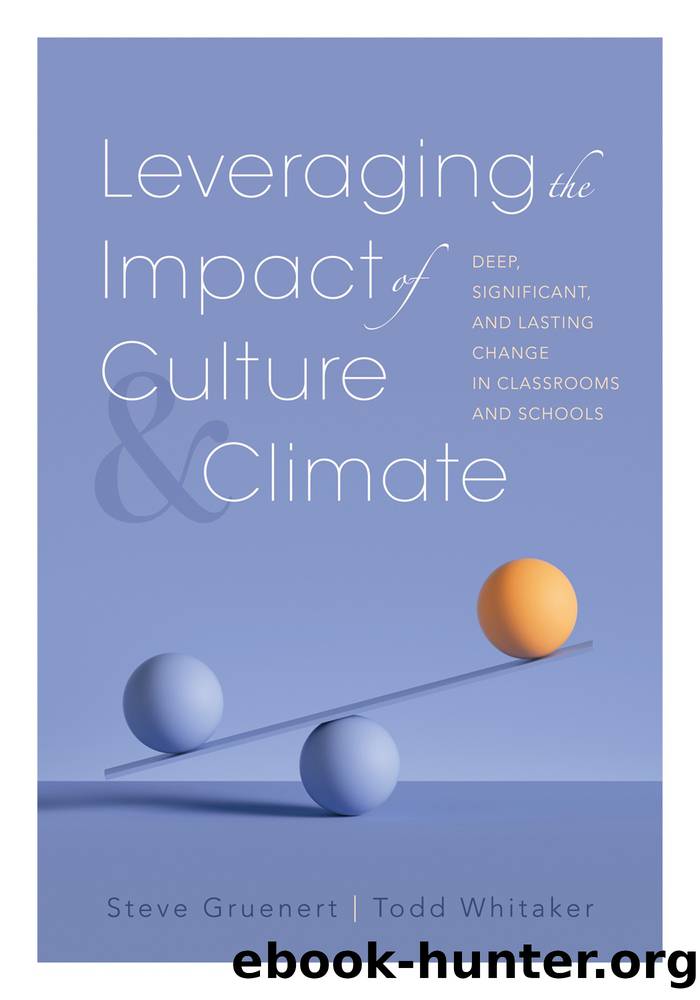Leveraging the Impact of Culture and Climate by Gruenert Steve;Whitaker Todd;

Author:Gruenert, Steve;Whitaker, Todd;
Language: eng
Format: epub
Publisher: Solution Tree
Published: 2021-08-15T00:00:00+00:00
Organic Culture
Some might call teachers who embrace an organic culture as back-to-nature people. They have a Zen quality about them that can cause classroom experiences to transcend the specified curriculum. To these teachers, allowing students to express themselves is more important than any other aspect of the curriculum. Organic teachers occasionally take the class outside to work in a natural setting. They feel comfortable taking class time to let students discuss their personal problems and will use that information to make the curriculum relevant. These teachers expend a lot of energy to get struggling or challenging students to trust them, as these teachers understand the power of mentoring. Struggling students seem to do well in this classroom culture and often seek the organic teacherâs personal opinions about life, even away from the classroom. His or her identification with challenging students leads to few behavioral issues in the classroom, but when misbehavior does occur, the teacher feels a sense of disloyalty and is hurt more than what other teachers might experience given the same situation.
Organic teachers enjoy trying new methods or projects at the expense of not completing old ones. The principal may consider these teachers effective since they provide an oasis for the discipline-problem students. These teachers believe the adult world is too serious, so educators should provide opportunities for students to laugh and have a good time. They tend to dress more like studentsânot so much sloppy as trendy. The principal knows if these teachers cannot reach certain students, nobody can.
The organic teacher has little respect for traditions, finding most obsolete. They have a charismatic quality only certain students perceive. Traditional teachers are often unimpressed with any sense of accomplishment an organic teacher may have; these types of teachers tend to avoid one another. Organic classrooms may seem chaotic at times, but the activity has purpose. The socializing that occurs could make a traditional teacher very uncomfortable, but learning is undeniably happening.
These teachers see everything in a studentâs world as potential for a new idea or learning opportunity; they see the world as a resource rather than as something to conquer.
Download
This site does not store any files on its server. We only index and link to content provided by other sites. Please contact the content providers to delete copyright contents if any and email us, we'll remove relevant links or contents immediately.
Competing on Culture by VanWagoner Randall;Sydow Debbie L.;Alfred Richard L.;(161)
Teaching Skills For Dummies by Sue Cowley(143)
The Art & Science of Web Design by Jeffery Veen(141)
Maker-Centered Learning by unknow(121)
People Skills by Thompson Neil(119)
Managing Unstoppable Learning by Hierck Tom;(110)
Lorange P. Learning and Teaching Business...Lessons...2022 by Unknown(107)
Motivating Defiant and Disruptive Students to Learn by Rich Korb(105)
Forces of Influence by Ende Fred;Everette Meghan;(101)
The InterActive Classroom by Nash Ron;(101)
Summarization in Any Subject by Wormeli Rick;Stafford Dedra;(99)
Connecting Through Leadership by Kullar Jasmine K.;(99)
Academic Advising and the First College Year by Jenny R. Fox; Holly E. Martin(97)
Teacher Mentoring and Induction by Portner Hal;(96)
Employee of the Month by Tracey Rogers(95)
What We Say and How We Say It Matter by Mike Anderson(92)
Reflective Practice in Action by Farrell Thomas S. C.;(91)
Teaching Behavior by Terrance M. Scott(90)
Leveraging Data for Student Success : Improving Education Through Data-Driven Decisions by Laura G. Knapp; Elizabeth Glennie; Karen J. Charles(89)
